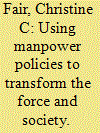|
|
|
Sort Order |
|
|
|
Items / Page
|
|
|
|
|
|
|
| Srl | Item |
| 1 |
ID:
140563


|
|
|
|
|
| Summary/Abstract |
AirSea Battle (ASB) has generated significant publicity, controversy, and debate among scholars, analysts, commentators, and observers of US defense strategy. However, a research gap exists concerning formal analysis of the impact of the operational concept on the relationship between the US Air Force (USAF) and the US Navy (USN). The impact of the ASB operational concept on the USAF–USN relationship is examined across the issue areas of strategy, budgets, weapons procurement, and training. These four issue areas represent important areas of historical conflict and competition between the Air Force and Navy. The conclusion is that ASB is ushering in a new era of Air Force–Navy partnership that advances the inter-service dynamic from “jointness” toward integration. The emergent USAF–USN partnership therefore represents a significant development in US defense politics and defense strategy.
|
|
|
|
|
|
|
|
|
|
|
|
|
|
|
|
| 2 |
ID:
130266


|
|
|
|
|
| Publication |
2014.
|
| Summary/Abstract |
Military manpower policies have an impact beyond the garrison. Policymakers have long held that military service can darn social fabrics that have been rent by ethnic, communal, class, and other cleavages, while scholars debate whether and how this occurs. Because military participation has implications for citizenship, marginalized groups have campaigned to be allowed to participate in the military, and leveraged their service to achieve greater enfranchisement. Military service affects the society as a whole in other ways as well: for example, leaders with military experience are less likely than others to prefer military force when other options are available. This paper examines the Pakistan Army, which, with its domination of the state, feared Islamist tendencies, and incessant belligerence toward India, seems to differ markedly from other militaries. But, using army recruitment and household survey data, it shows that even the Pakistan Army has used personnel policies to reshape its force, despite the numerous challenges of such a course. Whereas recent manpower studies dilate upon how socially marginalized groups employ military service to achieve greater access to citizenship, my analysis exposits how an army uses service in its ranks to cajole reluctant citizens into the national project of Pakistan and encumber them with the responsibilities and rights thereof. While this essay provides greater insights into the Pakistan Army specifically by focusing upon this ostensible anomaly, I hope to inform the larger literature on defense politics and the instrumentality of manpower policies.
|
|
|
|
|
|
|
|
|
|
|
|
|
|
|
|
|
|
|
|
|